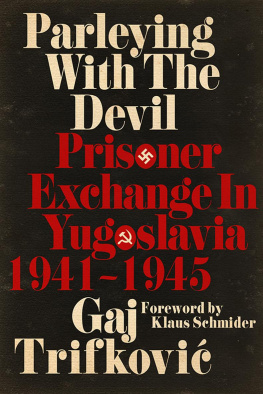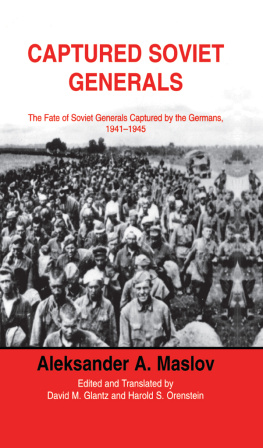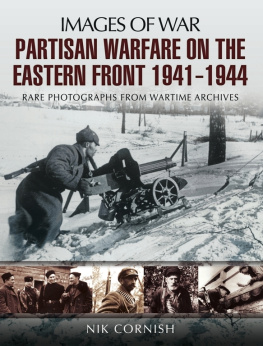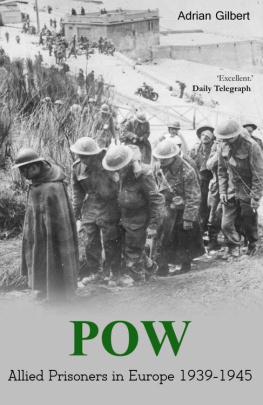Parleying with the Devil
Parleying with the Devil
Prisoner Exchange in Yugoslavia, 19411945
Gaj Trifkovi
Foreword by Klaus Schmider
Due to variations in the technical specifications of different electronic reading devices, some elements of this ebook may not appear as they do in the print edition. Readers are encouraged to experiment with user settings for optimum results.
Copyright 2020 by Brcourt Academic
Published by Andarta Books
An imprint of The University Press of Kentucky
Scholarly publisher for the Commonwealth,
serving Bellarmine University, Berea College, Centre
College of Kentucky, Eastern Kentucky University,
The Filson Historical Society, Georgetown College,
Kentucky Historical Society, Kentucky State University,
Morehead State University, Murray State University,
Northern Kentucky University, Transylvania University,
University of Kentucky, University of Louisville,
and Western Kentucky University.
All rights reserved.
Editorial and Sales Offices: The University Press of Kentucky
663 South Limestone Street, Lexington, Kentucky 40508-4008
www.kentuckypress.com
Cataloging-in-Publication data available from the Library of Congress
ISBN 978-1-94-966808-7 (hardcover)
ISBN 978-1-94-966810-0 (pdf)
ISBN 978-1-94-966811-7 (epub)
This book is printed on acid-free paper meeting
the requirements of the American National Standard
for Permanence in Paper for Printed Library Materials.
Manufactured in the United States of America.
| Member of the Association
of University Presses |
To my nuclear family
Contents
by Klaus Schmider
Foreword
Researching the events of the 1940s in war-torn Yugoslavia comes with multilayered challenges. The most important primary and secondary sources are available in more than half a dozen languages. The antagonisms of the era rose from the grave half a century later and still linger on to this day, thus placing obstacles in the way of unimpeded research and discussion. Available primary sources often reflect the type of bias that can be traced back to the writers rank, service, or nationality, and also the position he took with respect to the three-cornered Yugoslav civil war and/or relations with other occupation powers. The same dynamic is applicable to protagonists on the side of the resistance.
To navigate these shoals with success is enough of a challenge at the best of times. With Parleying with the Devil, Gaj Trifkovi has set the bar even higher by analyzing the phenomenon of prisoner exchanges in World War II Yugoslavia. The very existence of such arrangements in the midst of a conflict where the most important occupying power was dead set against the idea of negotiating with irregulars and a parallel civil war was fought with the utmost savagery by all contenders appears downright counterintuitive. The best known instance involved the so-called March Negotiations in 1943. Here, a prisoner exchange went hand-inhand with negotiations regarding the possible recognition of the Peoples Liberation Army by the Germans as a legitimate belligerent. Hitler quickly eliminated this possibility and what appeared to be a fleeting opportunity to de-escalate the conflict died a quick death.
Thanks to Trifkovis groundbreaking research, we now know that the story of prisoner exchanges in wartime Yugoslavia is far more complex than anyone had suspected. The March Negotiations were preceded by incidents that were more important than previously thought; the same goes for the more institutionalized prisoner swaps that were carried out in the last two years of the war. Neither side was too keen to advertise this practice, and this undoubtedly contributed to the scarcity of references in extant sources. The author deserves to be commended for his detailed, in-depth research and for ferreting out any available information.
The story that emerges is of an arrangement that reflects the military realities on the ground (the Germans became more keen as the war turned against them; the Partisans less so), but whose protagonists were well aware of the fact that they were operating on ice so thin that it could collapse at any moment under the weight of the ideological incompatibility of both sides. Hence, it was not uncommon for German and Partisan negotiators to connive in order to pull the proverbial wool over their respective superiors eyes.
World War II was the most global and total conflict in history, and within the European/Middle Eastern theater of war, Yugoslavia certainly had a unique blend of civil war and war of national liberation that brought about an intense level of savagery. That this setting witnessed such a continuous attempt at de-escalation flies in the face of just about everything we thought we knew about the dynamics of escalation. Parleying with the Devil will have scholars arguing for a generation.
Klaus Schmider
Royal Military Academy Sandhurst
Camberley, United Kingdom
Abbreviations
AVNOJAntifaistiko vijee narodnog osloboenja Jugoslavije (Anti-fascist Council of Peoples Liberation of Yugoslavia)
ICRCInternational Committee of the Red Cross
KIA; WIA; MIAKilled in Action; Wounded in Action; Missing in Action
KPHKomunistika partija Hrvatske (Communist Party of Croatia)
KPJKomunistika partija Jugoslavije (Communist Party of Yugoslavia)
NDHNezavisna drava Hrvatska (Independent State of Croatia)
NOPNarodnooslobodilaki pokret (Peoples Liberation Movement)
NOVJNarodnooslobodilaka vojska Jugoslavije (Peoples Liberation Army of Yugoslavia)
OKHOberkommando des Heeres (Army High Command)
OKWOberkommando der Wehrmacht (Armed Forces High Command)
OSSOffice of Strategic Services
OZAKOperationszone Adriatisches Kstenland (Operational Zone Adriatic Littoral)
OZNAOdjeljenje za zatitu naroda (Department for the Protection of the People)
POWPrisoner of War
RSHAReichssicherheitshauptamt (Reich Main Security Office)
SASturmabteilung (Storm Detachment)
SDSicherheitsdienst (Security Service)
SKOJSavez komunistike omladine Jugoslavije (Union of the Communist Youth of Yugoslavia)
SSSchutzstaffel (Protection Squad)
SuperslodaComando Superiore Forze Armate di Slovenia e Dalmazia (High Command of the Armed Forces in Slovenia and Dalmatia, alternative designation of the Italian 2nd Army)
UNSUstaka nadzorna sluba (Ustashe Surveillance Service)
ZAVNOBiHZemaljsko antifaistiko vijee narodnog osloboenja Bosne i Hercegovine (State Anti-fascist Council of Peoples Liberation of Bosnia and Herzegovina)
ZAVNOHZemaljsko antifaistiko vijee narodnog osloboenja Hrvatske (State Anti-fascist Council of Peoples Liberation of Croatia)
Note on the use of the terms Jger














